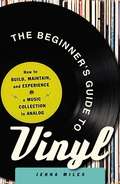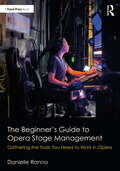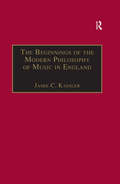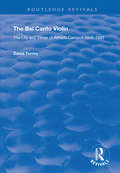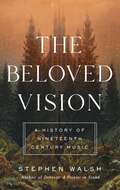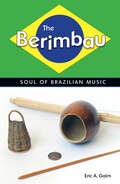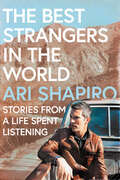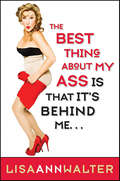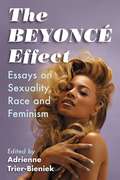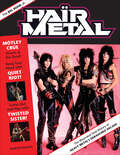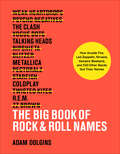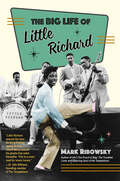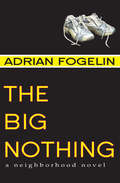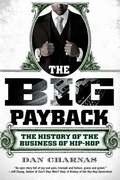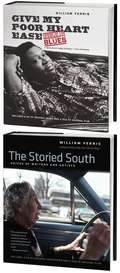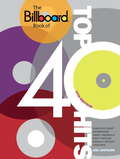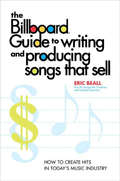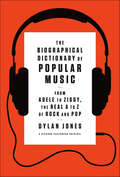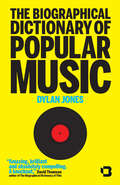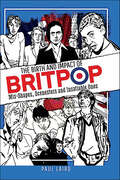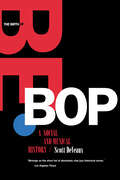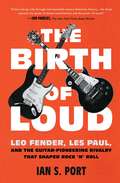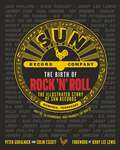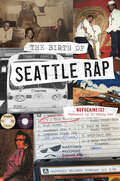- Table View
- List View
The Beginner's Guide to Vinyl: How to Build, Maintain, and Experience a Music Collection in Analog
by Jenna MilesThe ultimate guide to starting and keeping a record collection! Vinyl records are back--in a big way. Music lovers are turning back to vinyl for its pure sound and the fun of collecting. If you're ready to take the plunge, The Beginner's Guide to Vinyl will walk you through the basics of what is sure to become your newest passion. Whether your musical tastes are jazz, rock, country, classical, or show tunes, you can find vinyl records from your favorite artists--but you have to know where to look. And DJ-turned-vinyl-expert Jenna Miles will let you know all that and more. Check out:How records are madeWhere to purchase a turntableHow to take care of both the machine and your vinyl recordsAnd more!If you're a more advanced audiophile, you'll find plenty of information about hardware beyond the entry-level options, along with a backstage pass to tidbits and stories about artists and the industry that you've never heard before. It's the next best thing to an afternoon spent at the record store!
The Beginner’s Guide to Opera Stage Management: Gathering the Tools You Need to Work in Opera
by Danielle RannoThe Beginner’s Guide to Opera Stage Management is the first book to cover theatrical stage management practices specifically for opera productions, providing an invaluable step-by-step guide. Beginning with a brief history of opera and detailing its difference from musical theatre, the book covers stage management best practices through prep, rehearsals, tech, performance, and wrap up. From the moment a manager accepts a contract, right through to archiving paperwork, this essential toolkit covers each step of a stage manager’s journey. Working with a score, reading music, working with singers, conductors, and musicians, basic duties of a stage manager versus an assistant stage manager, and other tasks specific to opera are also included in this comprehensive guide. This book is full of tips and tricks, as well as the good, bad, and ugly stories from opera stage managers, sharing both their experiences and mistakes. This is the perfect how-to book for the professional or emerging stage manager looking to work in opera, or to expand their existing stage management skillset.
The Beginnings of the Modern Philosophy of Music in England: Francis North's A Philosophical Essay of Musick (1677) with comments of Isaac Newton, Roger North and in the Philosophical Transactions
by Jamie C. KasslerIn 1677 a slim quarto volume was published anonymously as A Philosophical Essay of Musick. Written by Francis North (1637-85), chief justice of the Common Pleas, the Essay is in the form of a legal case argued from an hypothesis. Utilising the pendulum as his hypothesis, North provided a rationale from mechanics for the emerging new musical practice we now call 'tonality'. He also made auditory resonance the connecting link between acoustical events in the external world and the musical meanings the mind makes on the basis of sensory perception. Thus began the modern philosophy of music that culminated with the work of Hermann von Helmholtz. As a step towards understanding this tradition, Jamie C. Kassler examines the 1677 Essay in its historical context. After assessing three seventeenth-century criticisms of it and outlining how one critic developed some implications in the Essay, she summarises the basic principles that have guided the modern philosophy of music from its beginnings in the 1677 Essay. The book includes an annotated edition of the Essay as well as the comments of the three critics.
The Bel Canto Violin: The Life and Times of Alfredo Campoli, 1906-1991 (Routledge Revivals)
by David TunleyFirst published in 1999, this biography from David Tunley draws on newly researched documentary evidence to chart Campoli’s early success and his later struggle for recognition as a serious artist. Campoli’s early success and his later struggle for recognition as a serious artist. Campoli’s career emerges as one particularly shaped and directed by the great economic and social forces of the first half of the century, and the story here is as much that of his times, as of his life. Described by Szigeti as ‘one of the last great individualists among violinists’, Alfredo Campoli was a household name in the field of British light music prior to the Second World War. Having made his début at the Wigmore Hall in 1923 Campoli toured with Melba and Butt, then turned to light music during the Depression. He became one of Decca’s early recording artists and broadcast frequently for the BBC with his light music ensembles and pursued a long, successful career as a distinguished international performer.
The Beloved Vision: A History of Nineteenth Century Music
by Ph.D. Stephen WalshA rich and luminous biography of nineteenth century music from the acclaimed author of Debussy: A Painter in Sound.When one thinks of &“great&” classical music—music with the most emotional resonance and timelessness—we harken back to the nineteenth century and the Romantic tradition. We recall the sweet melody of a Schubert song, the heroine dying for love in an Italian opera, the swooning orchestration of a Tchaikovsky symphony. The emotional resonance of nineteenth century has moved generations muscians and resonated with countless listeners. It has inspired artists and writers. But no writer until how has adopted such a vividly insightful narrative approach as Stephen Walsh and he shows how there is more to Romantic music that meets the eye—and the ear. With authority, insight, and passion, The Beloved Vision, links the music history of this singular epoch to the ideas that lay behind Romanticism in all its manifestations. In this complete, entertaining, and singularly readable account, we come to understand the entire phase in music history that has become the mainstay of the twentieth and twenty-first century concert and operatic repertoire. We also come to understand Beethoven, Mahler, Schubert, Chopin, and Wagner anew. The narrative begins in the eighteenth century, with C.P.E. Bach, Haydn and the literary movement known as Sturm und Drang, seen as a reaction of the individual artist to the confident certainties of the Enlightenment. The windows are flung open, and everything to do with style, form, even technique, is exposed to the emotional and intellectual weather, the impulses and preferences of the individual composer. Risk taking—the braving of the unknown—was certainly an important part of what the composers wanted to do, as true of Chopin and Verdi as it is of Berlioz and Wagner. It's an exciting, colorful, story, told with passion but also with the precision and clarity of detail for which Stephen Walsh is so widely admired. The Beloved Vision is a cultural tour de force, by turns bold, challenging, and immensely stimulating.
The Berimbau: Soul of Brazilian Music
by Eric A. GalmThe Brazilian berimbau, a musical bow, is most commonly associated with the energetic martial art/dance/game of capoeira. This study explores the berimbau's stature from the 1950s to the present in diverse musical genres including bossa nova, samba-reggae, MPB (Popular Brazilian Music), electronic dance music, Brazilian art music, and more. Berimbau music spans oral and recorded historical traditions, connects Latin America to Africa, juxtaposes the sacred and profane, and unites nationally constructed notions of Brazilian identity across seemingly impenetrable barriers. The Berimbau: Soul of Brazilian Music is the first work that considers the berimbau beyond the context of capoeira, and explores the bow's emergence as a national symbol. Throughout, this book engages and analyzes intersections of musical traditions in the Black Atlantic, North American popular music, and the rise of global jazz. This book is an accessible introduction to Brazilian music for musicians, Latin American scholars, capoeira practitioners, and other people who are interested in Brazil's music and culture.
The Best Strangers in the World: Stories from a Life Spent Listening
by Ari ShapiroINSTANT NEW YORK TIMES BESTSELLER“The Best Strangers in the World is a witty, poignant book that captures Ari Shapiro’s love for the unusual, his pursuit of the unexpected, and his delight at connection against the odds.”—Ronan Farrow, Pulitzer Prize-winning investigative journalist and New York Times-bestselling author of Catch and Kill and War on PeaceFrom the beloved host of NPR's All Things Considered, a stirring memoir-in-essays that is also a lover letter to journalism.In his first book, broadcaster Ari Shapiro takes us around the globe to reveal the stories behind narratives that are sometimes heartwarming, sometimes heartbreaking, but always poignant. He details his time traveling on Air Force One with President Obama, or following the path of Syrian refugees fleeing war, or learning from those fighting for social justice both at home and abroad.As the self-reinforcing bubbles we live in become more impenetrable, Ari Shapiro keeps seeking ways to help people listen to one another; to find connection and commonality with those who may seem different; to remind us that, before religion, or nationality, or politics, we are all human. The Best Strangers in the World is a testament to one journalist’s passion for Considering All Things—and sharing what he finds with the rest of us.
The Best Thing About My Ass Is That It's Behind Me
by Lisa Ann WalterActress and comic Lisa Ann Walter offers a hilarious, star-studded collection of essays encouraging women to laugh at what they can't change, enjoy a guilty pleasure or two, and finally accept the lives and the bodies they're in now. The star of shows like Abbott Elementary and movies like The Parent Trap, Shall We Dance, and Bruce Almighty delivers a warm, wry, honest, and effective exhortation to find happiness where you are, in a serenity prayer for today’s woman that’s perfect for fans of Gretchen Rubin’s The Happiness Project, Valerie Bertinelli’s Losing It and Chelsea Handler’s My Horizontal Life.
The Beyonce Effect: Essays On Sexuality, Race And Feminism
by Adrienne Trier-Bieniek<P><P>Since her late-1990s debut as a member of the R&B trio Destiny's Child, Beyonce Knowles has garnered both praise and criticism. While some consider her an icon of female empowerment, others see her as detrimental to feminism and representing a negative image of women of color. Her music has a decidedly pop aesthetic, yet her power-house vocals and lyrics focused on issues like feminine independence, healthy sexuality and post-partum depression give her songs dimension and substance beyond typical pop fare. <P><P>This collection of new essays presents a detailed study of the music and persona of Beyonce--arguably the world's biggest pop star. Topics include the body politics of respectability; feminism, empowerment and gender in Beyonce's lyrics; black female pleasure; and the changing face of celebrity motherhood.
The Big Bands
by George T. SimonGeorge T. Simon introduces you to the big band leaders during the period spanning 1935 to 1946.
The Big Book of Hair Metal: The Illustrated Oral History of Heavy Metal's Debauched Decade
by Martin PopoffMusic journalist Martin Popoff celebrates a decade of heavy metal debauchery in this illustrated history of Hair Metal bands.In the 1980s, heavy metal went mainstream. The dark themes and brain-busting riffage of bands like Black Sabbath and Deep Purple suddenly fell out of favor—replaced by a new legion of metalheads whose themes of girls, partying, girls, drugs, and girls were presented amid shredding solos and power ballads and who were somehow more acceptable to the masses. In this ultimate guide to the subgenre, acclaimed heavy-metal journalist Martin Popoff examines hair metal in an all-encompassing oral history jacked up by a kaleidoscope of outrageous and previously unpublished quotes, anecdotes, photos, and memorabilia.The Big Book of Hair Metal features the observations of dozens of musicians, producers, promoters, label execs, and hangers-on in examining hair metal’s rise and fall as well as all the bands that kept Aqua Net in business through the Reagan recession: Twisted Sister, Bon Jovi, Poison, Mötley Crüe, Ratt, Warrant, Great White, Whitesnake, Cinderella, Vixen, Skid Row, L.A. Guns, Guns N’ Roses, and dozens more. In crafting a narrative of hair metal, Popoff also examines the factors that contributed to the movement’s rise (including MTV, Reagan’s “morning in America,” and a general move toward prudish morals); the bands that inspired it (the Sweet, New York Dolls, Alice Cooper, and KISS, for a start); and the scenes that nurtured it (the Sunset Strip, anyone?). The ride finally ended circa 1991, when hair metal was replaced by grunge, but what a ride it was. Here it is in all of its primped-up glory.
The Big Book of Rock & Roll Names: How Arcade Fire, Led Zeppelin, Nirvana, Vampire Weekend, and 532 Other Bands Got Their Names
by Adam DolginsThe Big Book of Rock & Roll Names tells the behind-the-scenes stories of how the world’s most popular and influential rock and pop acts got their names. By turns fascinating, funny, and bizarre, the pages offer insight into the peculiar choices and idiosyncratic psychologies of hundreds of top musicians from the 1960s to the present. Originally published more than two decades ago to great success, it’s been out of print for years and has now been completely updated and expanded to feature dozens of exclusive interviews including conversations with groups like The Black Keys, The Killers, Twenty One Pilots, Coldplay, Cage the Elephant, and Vampire Weekend. From Arcade Fire to ZZ Top, this diverting and handsome collection reveals the often overlooked but defining histories of hundreds of the biggest names in rock and pop.
The Big Life of Little Richard
by Mark Ribowsky&“This entertaining, fast-paced biography&” of the legendary singer-songwriter &“will thrill fans of Little Richard and early rock and roll&” (Publishers Weekly). Richard Wayne Penniman, known to the world as Little Richard, blazed the trail for generations of musicians: The Beatles, James Brown, the Everly Brothers, Jimi Hendrix, the Rolling Stones, Elton John, Prince . . . the list seems endless. He was &“The Originator,&” &“The Innovator,&” and the self-anointed &“King and Queen of Rock &’n&’ Roll.&” In The Big Life of Little Richard, Mark Ribowsky shares the raucous story of his life from early childhood in Macon, Georgia, to his death in 2020. Ribowsky, acclaimed biographer of musical icons―including the Supremes, the Temptations, Stevie Wonder, and Otis Redding―takes readers through venues, gigs, and studios, conveying the sweaty energy of music sessions limited to a few tracks on an Ampex tape machine and vocals sung along with a live band. He explores Little Richard&’s musicianship; his family life; his uphill battle against racism; his interactions with famous contemporaries and the media; and his lifelong inner conflict between his religion and his sexuality. By 2020, eighty-seven-year-old Little Richard&’s electrifying smile was still intact, as were his bona fides as rock&’s royal architect: the &’50s defined his reign, and he extended elder statesmanship ever since. The Big Life of Little Richard not only explores a legendary stage persona, but also a complex life under the makeup and pomade
The Big Nothing (Neighborhood Novels Ser. #4)
by Adrian FogelinThis sensitive and often humorous book tells the story of an adolescent boy who begins to find himself after the people he has always depended on let him down. Alone. That's how thirteen-year-old Justin feels these days. His older brother Duane has left home, enlisting in the Army, and his father has walked out, maybe for good this time. His mom is too depressed to get out of bed, much less pay the bills and keep food in the refrigerator. And if that's not enough, his best buddy Ben has a new girlfriend and no longer has time to hang out. There's not much left for Justin to do but to put his brain in neutral and slide into the state he calls "the Big Nothing." But slowly Justin discovers he has more resources than he thinks. With the help of his classmate Jemmie and her grandmother, Nana Grace, he learns that underneath all the noisy confusion in his brain lies a talent for music. As he spends time with Jemmie, he begins to understand how simple notes make complex music, and how simple feelings can turn into deep emotions. Award-winning author Adrian Fogelin once again offers readers an emotionally charged story featuring a sympathetic adolescent trying to make sense of the people and world around him.
The Big Payback: The History of the Business of Hip-Hop
by Dan CharnasThe Big Payback takes us from the first $15 made by a "rapping DJ" in 1970s New York to the recent multi-million-dollar sales of the Phat Farm and Roc-a-Wear clothing companies in 2004 and 2007. On this four-decade-long journey from the studios where the first rap records were made to the boardrooms where the big deals were inked, The Big Payback tallies the list of who lost and who won. Read the secret histories of the early long-shot successes of Sugar Hill Records and Grandmaster Flash, Run DMC's crossover breakthrough on MTV, the marketing of gangsta rap, and the rise of artist/ entrepreneurs like Jay-Z and Sean "Diddy" Combs. 300 industry veterans-well-known giants like Rick Rubin and Russell Simmons, the founders of Def Jam, and key insiders like Gerald Levin, the embattled former Time Warner chief-gave their stories to renowned hip-hop journalist Dan Charnas, who provides a compelling, never-before seen, myth-debunking view into the victories, defeats, corporate clashes, and street battles along the 40-year road to hip-hop's dominance. Watch a Video .
The Bill Ferris Enhanced Omnibus E-Book
by William FerrisThis Omnibus Ebook for the first time brings together pioneering folklorist William Ferris's books on the music and arts of the South.Included in this ebook are:Give My Poor Heart Ease: Voices of the Mississippi Blues:Throughout the 1960s and 1970s, Ferris toured his home state of Mississippi, documenting the voices of African Americans as they spoke about and performed the diverse musical traditions that form the authentic roots of the blues. Now, Give My Poor Heart Ease puts front and center a searing selection of the artistically and emotionally rich voices from this invaluable documentary record. Illustrated with Ferris's photographs of the musicians and their communities and including original music and original film, the book features more than twenty interviews relating frank, dramatic, and engaging narratives about black life and blues music in the heart of the American South.The enhanced ebook edition includes: * Almost 2 hours of video clips and interviews scattered throughout the text* An hour of original music, also imbedded throughout the text* Concludes with the full DVD of original film and full CD of original musicThe Storied South: Voices of Writers and Artists:The Storied South features the voices--by turn searching and honest, coy and scathing--of twenty-six of the most luminous artists and thinkers in the American cultural firmament, from Eudora Welty, Pete Seeger, and Alice Walker to William Eggleston, Bobby Rush, and C. Vann Woodward. Masterfully drawn from one-on-one interviews conducted by Ferris over the past forty years, the book reveals how storytelling is viscerally tied to southern identity and how the work of these southern or southern-inspired creators has shaped the way Americans think and talk about the South.The enhanced ebook edition includes 45 of Ferris's striking photographic portraits of the speakers and original audio and films of the interviews.
The Billboard Book of Top 40 Hits, 9th Edition: Complete Chart Information about America's Most Popular Songs and Artists, 1955-2009
by Joel WhitburnThe Essential Reference Guide to America's Most Popular Songs and Artists Spanning More than Fifty Years of Music Beginning with Bill Haley & His Comets' seminal "Rock Around the Clock" all the way up to Lady Gaga and her glammed-out "Poker face," this updated and unparalleled resource contains the most complete chart information on every artist and song to hit Billboard's Top 40 pop singles chart all the way back to 1955. Inside, you'll find all of the biggest-selling, most-played hits for the past six decades. Each alphabetized artist entry includes biographical info, the date their single reached the Top 40, the song's highest position, and the number of weeks on the charts, as well as the original record label and catalog number. Other sections--such as "Record Holders," "Top Artists by Decade," and "#1 Singles 1955-2009"--make The Billboard Book of Top 40 Hits the handiest and most indispensable music reference for record collectors, trivia enthusiasts, industry professionals and pop music fans alike. Did you know? * Beyoncé's 2003 hit "Crazy in Love" spent 24 weeks in the Top 40 and eight of them in the #1 spot. * Billy Idol has had a total of nine Top 40 hits over his career, the last being "Cradle of Love" in 1990. * Of Madonna's twelve #1 hits, her 1994 single "Take a Bow" held the spot the longest, for seven weeks--one week longer than her 1984 smash "Like a Virgin." * Marvin Gaye's song "Sexual Healing" spent 15 weeks at #3 in 1982, while the same song was #1 on the R&B chart for 10 weeks. * Male vocal group Boyz II Men had three of the biggest chart hits of all time during the 1990s. * The Grateful Dead finally enjoyed a Top 10 single in 1987 after 20 years of touring. * Janet Jackson has scored an impressive 39 Top 40 hits--one more than her megastar brother Michael!From the Trade Paperback edition.
The Billboard Guide to Writing and Producing Songs That Sell: How to Create Hits in Today's Music Industry
by Eric BeallBeall, an experienced A&R executive for leading music publishers, has designed this guide for songwriters who want to craft material that will meet the demands of the commercial marketplace. The author uses interviews with successful writers, producers and executives to reveal the secrets that open doors in a very competitive industry, and he has developed practical exercises that will help budding songwriters create the titles, hooks, rhythms and melodies that will appeal to contemporary audiences. A section analyzes the components that allow a song to become a hit such as radio airplay, the science of marketing singles and how to target an audience in advance. Annotation ©2009 Book News, Inc. , Portland, OR (booknews. com)
The Biographical Dictionary of Popular Music: From Adele to Ziggy, the Real A to Z of Rock and Pop
by Dylan JonesThe Biographical Dictionary of Popular Music is an incredible and opinionated collection of celebrated cultural critic Dylan Jones's thoughts on more than 350 of the most important artists around the world—alive and dead, big and small, at length and in brief. This A to Z reference is the true musical heir to David Thomson's seminal The New Biographical Dictionary of Popular Film. Jones writes entertainingly about bands that have inspired, bedeviled, and fascinated him over the years.
The Biographical Dictionary of Popular Music: From Adele to Ziggy, the Real A to Z of Rock and Roll
by Dylan JonesThere are dozens of music encyclopedias, and many are full of career minutiae and critical acuityThey’re also obsessively objective and pathologically comprehensive. The Biographical Dictionary of Popular Music is a book that springs from personal prejudice. Celebrated journalist Dylan Jones works his way through the work of over three hundred fifty of the most important artists in the world—alive and dead, big and small, at length and in brief. From A Tribe Called Quest to Frank Zappa, via Chet Baker, the Clash, Brian Eno, and Gorillaz, with a nod to Quincy Jones, Frank Sinatra, Tame Impala, and Scott Walker. Along the way he discusses the White Man’s Overbite, Aquacrunk, Air Snare, the Brill Building, doo wop, Eel Pie Island, funeral music, and Neurotic Boy Outsiders.Many of the people here have been included because they’re intriguing, and many more because it would have been perverse not to include them. Others are here for different reasons. We know that Julian Lennon will never have as much cultural resonance as his father, but as the child of one of the most influential entertainers of the twentieth century, his story is no less fascinating. And Lloyd Cole might not have built a career as sturdy as Leonard Cohen’s, yet as a tale of unfilled promise, his CV is second to none. “As a critic, the music you like completely informs any objectivity you might attempt about a particular artist—if you’re seeking communion with something, how can you not have an opinion about it? When music moves you, it makes you dizzy, and you’ve got every right to dismiss music that leaves you cold and unmoved. Yes, you might trust the judgment of those whose opinion you respect, but in the end, personal prejudice has to win out.”The Biographical Dictionary of Popular Music is the most opinionated book about music you will ever read.
The Birth and Impact of Britpop: Mis-Shapes, Scenesters and Insatiable Ones
by Paul LairdRemember the ninteties? Of course you do. Cool Britannia, New Labour, Blur vs Oasis, Geri Halliwell’s Union Flag dress, TFI Friday, “wasssssuuuuuuppppppp”, Opal Fruits turning into Starburst without anyone asking your permission…crazy times. This book doesn’t have anything to say about Geri’s dress or Opal Fruits but it has lots to say about Britpop. But this isn’t a book about the Britpop you think you know about, this is the story of a truly remarkable period of creativity in British guitar music told through the experiences of someone who was there from the first note of “Popscene” through to the run out groove of “This is Hardcore”. This is the story of the Britpop that didn’t make it onto the evening news or the cover of The Face. This is the story of the bands nobody remembers but that everybody should. This is the story of what it was like to be an outsider in 1991 and be too cool for school by 1994. This is the story of a magnesium flash in British popular music that has, for good or ill, defined British guitar music ever since. Here are Flamingoes and Pimlico, Strangelove and David Devant and His Spirit Wife, The Weekenders and Thurman…and Blur, Pulp, Oasis, Sleeper and Elastica too. These are Britpop memories from someone who was actually there. The definitive story of Britpop…
The Birth of Bebop: A Social and Musical History
by Scott DeVeauxThe richest place in America's musical landscape is that fertile ground occupied by jazz. Scott DeVeaux takes a central chapter in the history of jazz—the birth of bebop—and shows how our contemporary ideas of this uniquely American art form flow from that pivotal moment. At the same time, he provides an extraordinary view of the United States in the decades just prior to the civil rights movement. DeVeaux begins with an examination of the Swing Era, focusing particularly on the position of African American musicians. He highlights the role played by tenor saxophonist Coleman Hawkins, a "progressive" committed to a vision in which black jazz musicians would find a place in the world commensurate with their skills. He then looks at the young musicians of the early 1940s, including Charlie Parker, Dizzy Gillespie, and Thelonious Monk, and links issues within the jazz world to other developments on the American scene, including the turmoil during World War II and the pervasive racism of the period. Throughout, DeVeaux places musicians within the context of their professional world, paying close attention to the challenges of making a living as well as of making good music. He shows that bebop was simultaneously an artistic movement, an ideological statement, and a commercial phenomenon. In drawing from the rich oral histories that a living tradition provides, DeVeaux's book resonates with the narratives of individual lives. While The Birth of Bebop is a study in American cultural history and a critical musical inquiry, it is also a fitting homage to bebop and to those who made it possible.
The Birth of Loud: Leo Fender, Les Paul, and the Guitar-Pioneering Rivalry That Shaped Rock 'n' Roll
by Ian S. PortA riveting saga in the history of rock ‘n’ roll: the decades-long rivalry between the two men who innovated the electric guitar’s amplified sound—Leo Fender and Les Paul—and their intense competition to convince rock stars like the Beatles, Jimi Hendrix, and Eric Clapton to play the instruments they built.In the years after World War II, music was evolving from big-band jazz into the primordial elements of rock ’n’ roll—and these louder styles demanded revolutionary instruments. When Leo Fender’s tiny firm marketed the first solid-body electric guitar, the Esquire, musicians immediately saw its appeal. Not to be out-maneuvered, Gibson, the largest guitar manufacturer, raced to build a competitive product. The company designed an “axe” that would make Fender’s Esquire look cheap and convinced Les Paul—whose endorsement Leo Fender had sought—to put his name on it. Thus was born the guitar world’s most heated rivalry: Gibson versus Fender, Les versus Leo. While Fender was a quiet, half-blind, self-taught radio repairman from rural Orange County, Paul was a brilliant but egomaniacal pop star and guitarist who spent years toying with new musical technologies. Their contest turned into an arms race as the most inventive musicians of the 1950s and 1960s—including bluesman Muddy Waters, rocker Buddy Holly, the Beatles, Bob Dylan, and Eric Clapton—adopted one maker’s guitar or another. By the time Jimi Hendrix played “The Star-Spangled Banner” at Woodstock in 1969 on his Fender Stratocaster, it was clear that electric instruments—Fender or Gibson—had launched music into a radical new age, empowering artists with a vibrancy and volume never before attainable.
The Birth of Rock 'n' Roll: The Illustrated Story of Sun Records and the 70 Recordings That Changed the World
by Peter Guralnick Colin EscottIn Memphis, Tennessee, in the 1950s, there was hard-edged blues playing on Beale Street, and hillbilly boogie on the outskirts of town. But at Sam Phillips&’ Sun Records studio on Union Avenue, there was something different going on – a whole lotta shakin&’, rockin&’, and rollin&’. This is where rock &’n&’ roll was born. Sun Records: the company that launched Elvis Presley, Jerry Lee Lewis, Johnny Cash, Roy Orbison, and Carl Perkins. The label that brought the world, &“Blue Suede Shoes,&” &“Whole Lotta Shakin&’ Goin&’ On,&” &“Breathless,&” &“I Walk the Line,&” &“Mystery Train,&” &“Good Rockin&’ Tonight.&” The Birth of Rock &’n&’ Roll: 70 Years of Sun Records is the official history of this legendary label, and looks at its story in a unique way: through the lens of 70 of its most iconic recordings. From the early days with primal blues artists like Howlin&’ Wolf and B.B. King to long nights in the studio with Elvis and Jerry Lee Lewis, you will see how the label was shaped and how it redefined American music. Accompanying the recordings is the label&’s origin story and a look at the mission of the label today, as well as &“Sun Spot&” sidebars—a fascinating dive into subjects such as how the iconic logo was created, the legendary Million Dollar Quartet sessions, and how the song &“Harper Valley, PTA&” funded the purchase of the label. Written by two of the most acclaimed music writers of our time, Peter Guralnick and Colin Escott, and featuring hundreds of rare images from the Sun archives as well as a foreword by music legend Jerry Lee Lewis, this is a one-of-a-kind book for anyone who wants to know where it all started.
The Birth of Seattle Rap (Narrative)
by Novocaine132From the Seattle streets to studio beats.In the early 1980s, a subterranean shift in Seattle’s music scene began. Disco’s reign over parties and dance clubs faded, and hip-hop became the new attraction. A generation of young musicians emerged, and local rappers catapulted the genre into the spotlight. From Sir Mix-A-Lot, who won a Grammy in 1993, to Silver Chain Gang and Jam Delight, the Emerald City produced some incredible talent. These formative years of hip-hop set the tone for the decades that followed, and this once-fledgling music still resonates in pop culture today. Author and producer Novocaine132 explores Seattle’s early rap artists and their groundbreaking sound.
